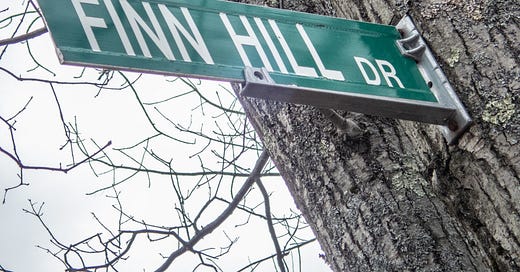FINNS: An Oral History of Finnish-Americans in New Hampshire’s Monadnock Region
Excerpted from FINNS: An Oral History... by Patricia Kangas Ktistes, 1997, all rights reserved.
Lisa Traffie
People ask all the time, “How many brothers and sisters?” There were 14 and I never would have wanted to grow up in a small family. My father and mother moved to this area from the Midwest and built the house in Ashby where I grew up and so they’ve been there for 30 years. I think I had a pretty normal childhood, but we never had a lot of friends over; we played with our brothers and sisters. When we were young, it was a competition to learn things. Whereas now it’s recognized that we’re all different and I have different relationships with all of my brothers and sisters. I think as children we had a sense of security; you do when you always have brothers and sisters around. We shared bedrooms all the time; you never had your own ‘spot,’ so to speak. I mean, somebody could always be there. And sharing clothes: “You didn’t want that green sweater? I’ll take it.” I think mostly our sense of security came from close relationships. We couldn’t all have one-on-one attention with Mom or Dad. But there was one-on-one with siblings. You always looked up to them, could always get an opinion from them. There was always a time when they would do things with you. I have a friend who was an only child. And now in our 20s, we do things together that she never got to do because of not having siblings to do things with. Growing up in our home gave me a lot of confidence; I could teach my younger sisters and brothers. That’s the other thing. Because I took care of younger brothers and sisters, I’m responsible. And as a result, sometimes at work I have taken on responsibilities that didn’t necessarily come through in a paycheck. It was simply something you did to make other people’s lives easier. And that’s what you have to do in a big family: you have to be independent but also help everybody else. I think if I had gone to school in New Ipswich, I might have encountered fewer types of people than in Ashby. I had to develop a lot of so-called ‘worldly’ relationships. Being around different people helped build individualism, versus being like the rest of the group. And I think I looked upon the differences between our family and others as, “Okay, that’s their choice.” It was okay if I talked to someone who wore earrings or was from a family that had TV or went to the movies. I think that approach to dealing with cultural differences helped. But it was hard when kids from other backgrounds would say, “Oh, did you see this on TV last night?” I would say, “No. We don’t have a TV.” Their reaction was, “Oh, you poor thing!” Little did they know what I really had! But you could invite any of those kids over on any given day and they knew there was something more at our house than they had. Whether it was everybody being at home at the same time or how we treated each other, I think they were amazed we were all so grown-up for our ages for two reasons: one, from having responsibility, and two, from competition between siblings. I didn’t have close friends other than my family up until I was in seventh grade, which I think was a transition point in my life. I went to the middle school, where there was nobody else from my family; I also had to travel on the bus alone. Growing up in a large family, it is possible to get lost in what everybody else is doing. You do things as a group and sometimes to ‘do your own thing’ is not so easy. After I graduated, I lived with two of my sisters. I came home from work at three o’clock and felt lost until they came home; I had always thought there was something wrong with feeling alone. But then one day it hit me that it’s okay. You find things to do, you search out other people, and I think it made me feel alive. In large families, mothers are very busy. My mother kept the household moving. And on the topic of mothers, my mother never yelled. She is the most patient person I’ve met in my life and I give her all the credit in the world. But if she said, “Lisa Ann,” you knew she wanted you right away. And so when I went to my friends’ houses and their mothers yelled, it shattered me. We didn’t have an atmosphere of yelling and fighting. You had to learn how to get along.



